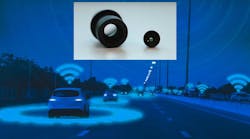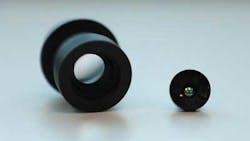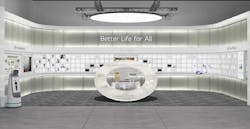New Hybrid Lenses Built for Autonomous Driving and Driver Monitoring
Check out more of our CES 2023 coverage
Cameras are key components of autonomous-driving and driver-recognition solutions as they help detect the driver's movements. The camera lenses employed are mounted in camera modules. In Europe, all vehicles are recommended to be equipped with driver monitoring systems (DMS) after 2025.
LG Innotek, headquartered in Seoul, Korea, has developed new lenses for DMS and advanced driver-assistance systems (ADAS) applications. What distinguishes them is that the company applied plastic and glass inside the lens, while other lenses use only glass to prevent structural deformation due to alteration in temperature or external forces. The high-performance hybrid lenses have reduced size and thickness, and it’s claimed that they’re price competitive with existing products in the market.
The new high-performance hybrid lenses are 20% to 30% less thick than full-glass products. Given that cameras are increasingly being used inside the car, the new lenses will give carmakers more flexibility in vehicle design, according to the company.
Overcoming Challenges with Plastic
LG Innotek points out that the high-performance hybrid lens maintains constant performance regardless of temperature and can accurately recognize objects. Plastic, which expands and contracts, is less stable than glass, making it difficult to make a solid lens with plastic.
Plastics vary in performance and shape depending on heat and pressure. For this reason, it was a big challenge to introduce plastic into automotive lenses that prioritize safety. This is because vehicle parts must maintain their performance in various driving environments such as dry deserts, severe cold and extreme heat.
“As they get thinner, they have the advantage of increased freedom in interior and exterior designs," said a company spokesperson. "The higher the level of self-driving, the more sensing devices will be used. So, it is important to reduce the size of the parts."
Furthermore, because camera modules are being placed toward the roof of the car rather than on the dashboard, carmakers are requiring lenses that can be readily hidden from view.
According to data by Strategy Analytics, the global self-driving camera market is expected to grow by around 17% annually to $6.7 billion in 2025, up from $3.28 billion in 2021.
"We expect LG Innotek's high-performance hybrid lens, which has overcome the limitations of plastic with innovative technologies, to create a huge wave in the market," said LG Innotek CTO Kang Min-seok.
“Better Life for All” Exhibit at CES
LG Innotek’s parent company, LG Electronics (LG), will be putting the spotlight on sustainability at CES 2023, January 5-8 in Las Vegas, Nev., showcasing its Environmental, Social and Corporate Governance (ESG) vision and latest innovations in an exhibit dubbed the “Better Life for All” zone.
To begin the event, CEO William Cho will take to the stage to present his vision for LG’s future, sharing key areas of focus for 2023 and beyond. Providing an overview of LG’s sustainability efforts, including its major ESG milestones, current initiatives, and long-term goals, the “Better Life for All” zone consists of three sections: “For the Planet,” “For People,” and “Our Commitment.”
The exhibit also will introduce the four finalist entries of LG’s inaugural LIFE’S GOOD AWARD, an innovation challenge created to spread the company’s “Life’s Good” message and empower innovators seeking to make a positive difference for people and the planet.
Key areas of focus for LG's ESG agenda have been built into the CES “Better Life for All” zone. Informational materials provided will offer braille for those with visual impairments and be placed at a height that enables easy reading for people using wheelchairs. Guides proficient in sign language will be on site, too, along with an LG CLOi GuideBot programmed to deliver digital-human sign language services. The zone itself will be constructed with the use of eco-friendly materials.


